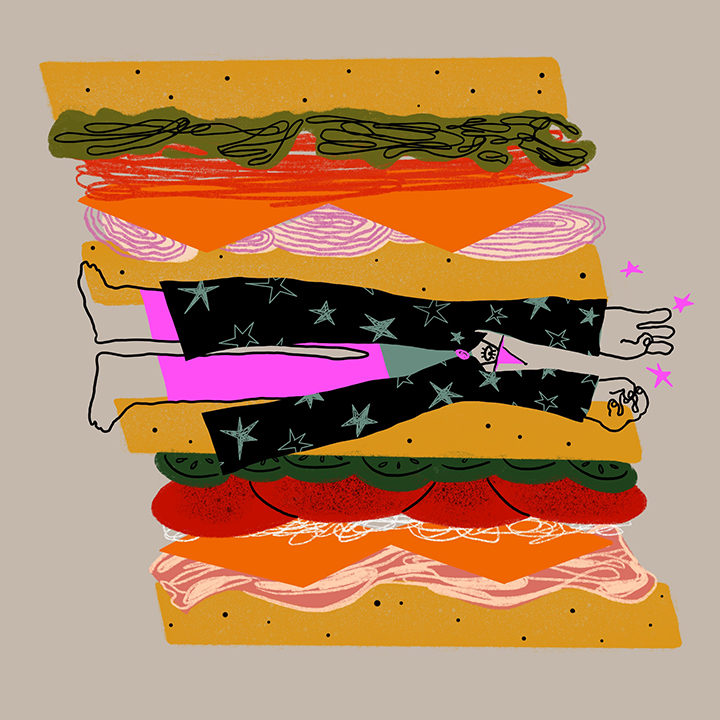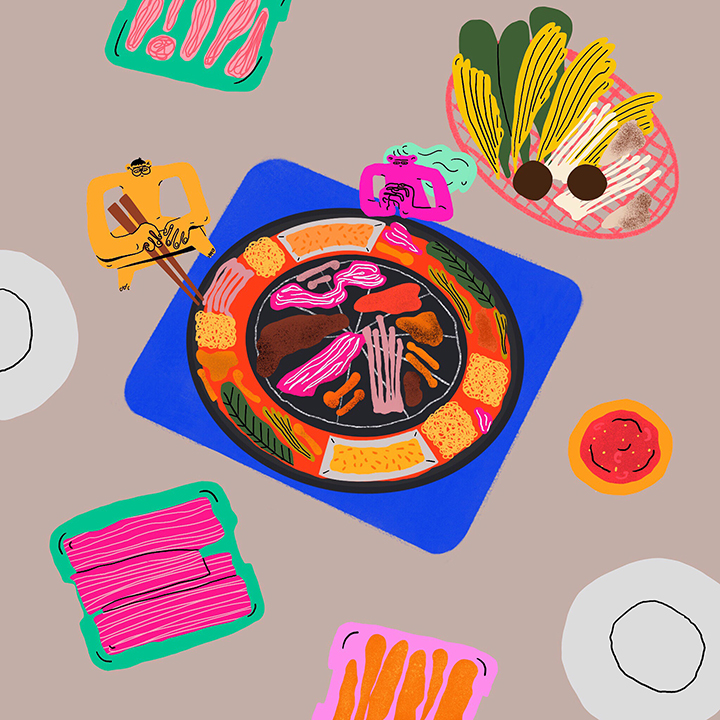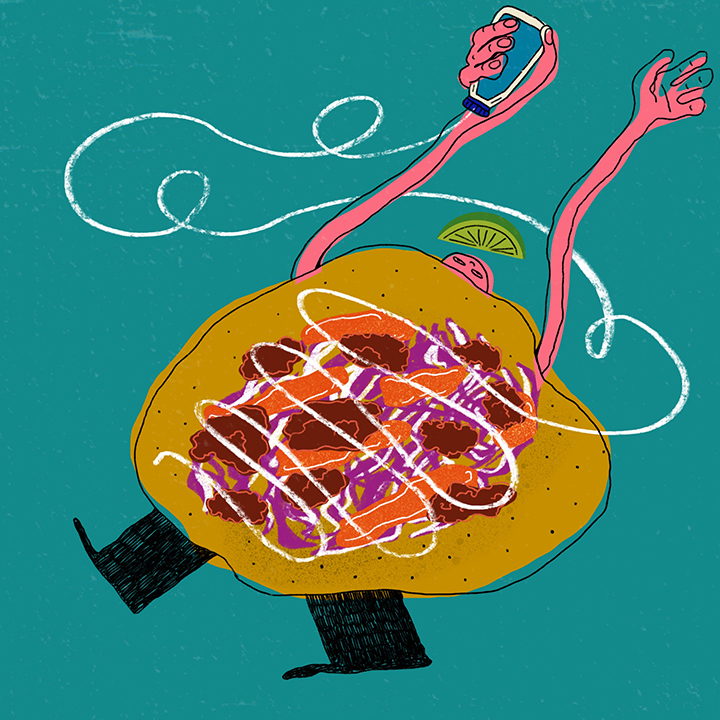Kezia Gabriella
Meet art director and illustrator from Singapore, Kezia Gabriella.

Tell us a little bit about yourself.
I’m Kezia, an art director and illustrator based in Singapore. I kickstarted my creative career by working full-time in the advertising industry. Currently, I’m working as a creative in a brand consultancy firm. I enjoy creating weird stories and illustrations that reflect the mishaps of my everyday life. When I’m not drawing, I usually spend my time making ceramic pots, reading books, watching stand-ups and playing with stray cats in my neighbourhood.
Describe the city you’re living in and what it’s like to live there.
Singapore is a hustle town with long working hours. Everybody is always occupied to work harder, better, and faster — especially in the creative industry. The energy is intense, restless and busy. Over here, a day goes by very fast and it always feels that nobody has enough time for everything.
Living in Singapore propels me to constantly improve my craft, but it can be a double-edged sword, often at times it leads me to make art just for the sake of producing.
As an artist, there are a lot of communities and like-minded people who are very open to supporting each other’s works. It’s also very diverse and multicultural — the nation consists of different cultures, ethnicities, and religions that coexist side by side without losing their original identities. For someone who likes to tell stories, it’s always inspiring to hear things from a different cultural perspective.
What is the best and worst thing about living in your city?
As an artist, there are a lot of communities and like-minded people who are very open to supporting each other’s works. It’s also very diverse and multicultural — the nation consists of different cultures, ethnicities, and religions that coexist side by side without losing their original identities. For someone who likes to tell stories, it’s always inspiring to hear things from a different cultural perspective.
However, the city is also very compact and doesn’t have a lot of natural spaces to escape from the hustle and bustle of city life.
Give us 3 words that describe what it’s like to be a creative in your city.
Oddballs. Exhausting. Growing.
How did you start your career in art?
I have been drawing since I was a kid, however, it never occurred to me that I will end up pursuing a career in the creative scene. I learned how to draw by tracing the artworks of newspaper comics and Japanese manga. It gave me a good grasp on visual storytelling through text and facial expression.
Before I was enrolled in art school, I was initially studying economics in a public university in Indonesia, and that was when I decided to pursue graphic design as my studies instead. I moved to Singapore in 2013 and was enrolled in LASALLE College of the Arts Singapore. During my university days, I was very fond of narrative-driven artworks: from children’s books, mid-century cartoons, comic strips to old-school advertisements — these platforms have similarities in keeping the audience engaged through such a simple and straight-forward outcome.
My advertising background plays a big role in shaping the tone of my illustrations. At first, I started illustrating as a way to unwind from my 9 to 6 job, until some of my colleagues suggested to have a take on the struggles surrounding the agency life. I found it interesting because of how relatable it was back then. So now I have the habit to list down my mishap of the week on my phone, even after I have left the industry. At the end of the day, I believe that my setbacks in life can be someone else’s good laugh.
At the end of the day, I believe that my setbacks in life can be someone else’s good laugh.
Were the people around you supportive of your decision on working as a creative?
My family always knew that I liked drawing, but they weren’t totally on board with the idea of pursuing arts as a career. Up until now, I think my parents don’t really understand the scope of my job. However I have an amazing life partner that is also in the same line of work, and I’m always grateful that we share a similar passion for creating arts. We also do collaborative projects and help each other out whenever we have a creative block. Creativity takes courage, and it feels so much easier to be in the industry when you have someone that reminds you not to be afraid.
What are some goals and ambitions you have for your future work?
There are too many — some of my short-term goals are to self-publish my own comic book and to be able to illustrate full time. Meanwhile, the long-term ones would be to relocate somewhere outside of Asia and to build a studio practice with my fiancé.
There are too many — some of my short-term goals are to self-publish my own comic book and to be able to illustrate full time. Meanwhile, the long-term ones would be to relocate somewhere outside of Asia and to build a studio practice with my fiancé.
If you could collaborate with any person in the world who would it be?
Dave Chapelle and Liana Finck. Both of them are in a different line of work and have a stark contrast in terms of delivery, but their comedy is always fresh and engaging. I think collaborating with them would be an interesting mash-up.
How would you describe the women around you?
They’re passionate, hard-working, driven, strong and compassionate. Being in the creative industry, I am surrounded by a lot of colleagues-turned-friends that always have goals in mind. They know exactly what they want and will always work hard to make it happen.
Were there any local female creatives that you looked up to when you were growing up?
Unfortunately no. Primarily because the local art scene is still progressing compared to the heavy wave of western pop culture influence. Growing up, I was more influenced by western contemporary artists such as Le Corbusier and the Bauhaus movement. Hopefully, in the future, there will be more highlights upon the local female artists, especially in Asia.
Are there any challenging aspects of being a female in your industry?
Personally I haven’t experienced much of a challenge as a female artist. Locally, I think the male and female artists are quite collaborative and there isn’t much of a divide. There’s more focus on the craft instead of the creator, which I think is very encouraging.
Curse when you need to curse, cry when you need to cry, but after that, you will need to learn how to laugh once in a while — even at yourself.
Do you have any advice to young women who are aspiring to work in your field?
Firstly, have a sense of humour. Life as an artist is hard and it will test your perseverance most of the time. If you get bogged down by how difficult the industry is, it’s hard to move forward. Curse when you need to curse, cry when you need to cry, but after that, you will need to learn how to laugh once in a while — even at yourself.
Secondly, a girl needs to eat, therefore you will find yourself at times working on things that you don’t feel passionate about. So have a side hustle — it’s always those personal works and things that you do for fun that will end up fulfilling. Your passion project is always organic, raw and captures your utmost thoughts. And it is worth more than any commercial project.
Last but not least, see things like a kid. Making art is supposed to be fun so don’t aim for perfection and keep on experimenting.
Photos courtesy of Kezia Gabriella.
Website:
Instagram:
Dribble:
Category:
SingaporeDate:
November 11, 2019











